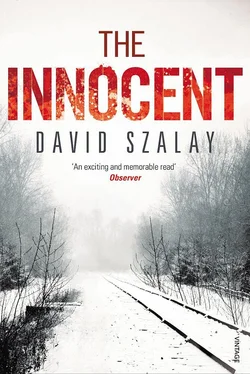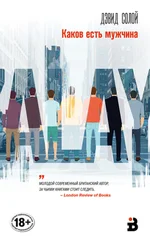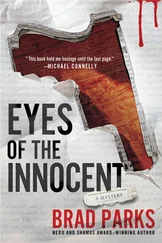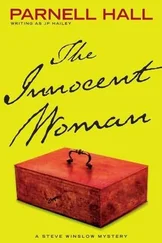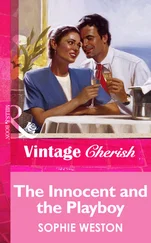‘Who?’
Afanasyev, of course.
He lay on the tiled floor, with his head propped on something, perhaps his jacket. His face was ashen. Someone had loosened his tie. The light fell from above, through the filthy, orange, translucent dome. He seemed unconscious. I was immediately sorry that I had been so furious, that I had made the poor old fellow sit for over two hours in the sun. He looked so helpless, so stricken – a forty-eight-year-old lieutenant. A man who in twenty-eight years of service had risen from junior lieutenant to senior lieutenant. His chin shone with saliva, his grey moustache looked wet. ‘Has someone called an ambulance?’ I said.
A strange silence had fallen in the Orangery. Probably they had found Afanasyev’s Ministry of State Security card in his jacket pocket. They parted to let me through, and I squatted down next to his head. If he was aware of me at all, it seemed unlikely that he knew who I was. I put my hand on his shoulder – his shirt was literally sodden – and said, ‘You’re going to be okay, Afanasyev.’ I don’t know why I used his surname. ‘You’re going to be okay,’ I said in a whisper. And for a minute I stayed there, with my hand on his wet shoulder.
My eyes started to wander nervously – on the nearest table there was a newspaper, an untouched tea with a segment of lemon suspended in it. Further off, three dusty pot plants stood awkwardly under the little dome. I felt the cool grittiness of the tiled floor under my palm.
Afanasyev was shivering. ‘Put his jacket over him,’ I said. A woman placed it over his torso. ‘When was the ambulance called?’
Someone said, ‘Ten minutes ago?’
I squeezed Afanasyev’s shoulder and stood up.
The standing heat, the looser noises of outside, struck me as I stepped out of the Orangery. It was half past two – I had been in there for only a few minutes. Making my way towards the place where the Pobeda was parked, I felt feverish and did not notice Ivanov until I was quite near him. The park was full. There were people everywhere. Ivanov was standing on the path near the water’s edge. He had his pistol in his hand. When I saw that all sound seemed to fall away. There was a man in a linen suit and a panama hat, walking towards Ivanov. I was not sure it was Lozovsky until he stopped, and turned, and started to walk the other way, towards me. I thought I saw Ivanov lift his pistol. ‘No!’ I shouted. ‘Don’t shoot!’ In his panic, Lozovsky seemed to push over a child, who started to scream. The child’s mother was shouting at Lozovsky. She snatched his sleeve and shook it, and it was then that he saw me. His mouth was open, he was panting slightly, his face had a sheen of perspiration. For a few moments the woman kept shouting at him. Then, sensing something intense about his silence, she stopped. ‘Hello, Mikhail Naumovich,’ I said, walking up to them, forcing myself to look him in the eye. I put my hand on his arm. ‘I want a word with you.’
We left the park at a measured pace. People stepped off the path to let us pass. I was only vaguely aware of them. I had my hand on Lozovsky’s arm, and was probably squeezing it tightly. He had still not said a word, and sat in the Pobeda as if he was expecting a lift home, innocently fanning himself with his panama hat. ‘What’s this about?’ he said. I put my hand in my jacket pocket – I was not wearing my jacket; it was next to me on the seat – and pulled out the arrest warrant. He looked at it while Ivanov started the engine. ‘What does this mean?’ he said. ‘Is it because I didn’t sign that form?’
‘No.’
‘Why then?’
‘I’m not supposed to say,’ I said. ‘It’s something you wrote.’
‘Something I wrote? What?’
I was aware of Ivanov listening from his seat in the front. He turned the Pobeda onto Karl Libknekht Street. ‘Something you wrote in the thirties. In a scientific journal.’
‘What thing?’ Lozovsky was almost shouting. ‘What scientific journal?’
‘I’m sorry,’ I said, turning to the window. ‘I’m sorry.’ I had a splitting headache, and was suddenly extremely sleepy. I just wanted to sleep.
It was not a long drive, only a few minutes. I left the paperwork to Ivanov and went to tell Mikhalkov what had happened. Then, on my way home, I went to the hospital to see how Afanasyev was. He seemed surprisingly well. ‘What happened?’ I said. ‘What was it?’
‘Diabetes.’
‘Well …’ I said. ‘That’s not so bad. I was worried. I thought it was a heart attack or something.’
Afanasyev shook his head. ‘No,’ he said. ‘Diabetes.’
A few days after Lozovsky’s arrest I went to Metelyev Log for the last time. I was looking through the books in his office – with one exception, they were medical textbooks in Russian, English and German – when there was a knock on the door. ‘Yes!’ I shouted. Sosnovsky put his head in. ‘It’s that bloke again,’ he said. I was turning the pages of a huge volume – not merely written in German, but printed in Gothic script – and did not look up. ‘What does he want?’
‘He says he wants to talk to you,’ Sosnovsky said.
‘Okay.’
He opened the door a little wider. Entering the sunny room, Dyomkin looked at me shiftily. ‘Where’s Mikhail?’ he said.
‘Professor Lozovsky’s not coming back.’
‘Oh?’
‘I’ve got this for you.’ It was the letter offering him Lozovsky’s job.
He looked quickly at the official envelope.
‘Open it,’ I said.
Frowning, he tore it open and pulled out Gasselblat’s letter. I watched him as he read it. His face – he looked a little like Otto Schmidt, the polar explorer – was impassive. The letter did not, of course, explain what had happened to Lozovsky. When he had finished, he looked up.
‘So?’ I said.
‘So?’
‘Will you take the job?’
He laughed. ‘Do I have a choice?’
‘Of course.’
There was a long pause. Then, with a shrug, he said, ‘I’ll take it.’
‘Well … congratulations. When we’ve finished in here, you can move your stuff in.’ He nodded, but did not move. He seemed unsure of himself – of the meaning of what had just happened, of what he should do. ‘Oughtn’t you to telegraph them,’ I suggested, ‘and let them know you’re taking the job? The oblispolkom.’ He stared at me for a moment, then turned to leave. ‘And I’d like a word with you later, if you’ve got a minute.’
He did not acknowledge this immediately. First, with a sort of flourish, he opened the door. Then he said, ‘For you, Major, I always have a minute.’
It was noon when I finished searching Lozovsky’s office. I found only one thing of interest – a slim volume by a man named Nikolay Maksimovich Luzhov, which I took with me. Leaving Sosnovsky to watch things, Voronin and I left the hospital and set off down the forest track to the house. Ivanov and Timashev were sitting on the wooden steps of the house laughing about something when we walked up to them. ‘Everything alright?’ I said.
Ivanov said, ‘A woman was here. She wanted to go in. She said she lived here.’
‘Did you let her?’
‘No.’
‘She was probably Lozovsky’s wife.’
‘She was.’ Ivanov smiled. ‘Wanted to know if we’d seen her husband.’
‘What did you say?’
‘I said we hadn’t.’
‘When was this?’
‘An hour ago?’
‘Do you know where she went?’
They shook their heads.
I knew the interior of the house well. It was low and small-windowed. Everything was wood, though variously hued – the floor, the walls, the furniture. Everything except the stove. When I touched it, it was warm. ‘Okay,’ I said to Voronin, who had followed me in. ‘Let’s start.’
Читать дальше
